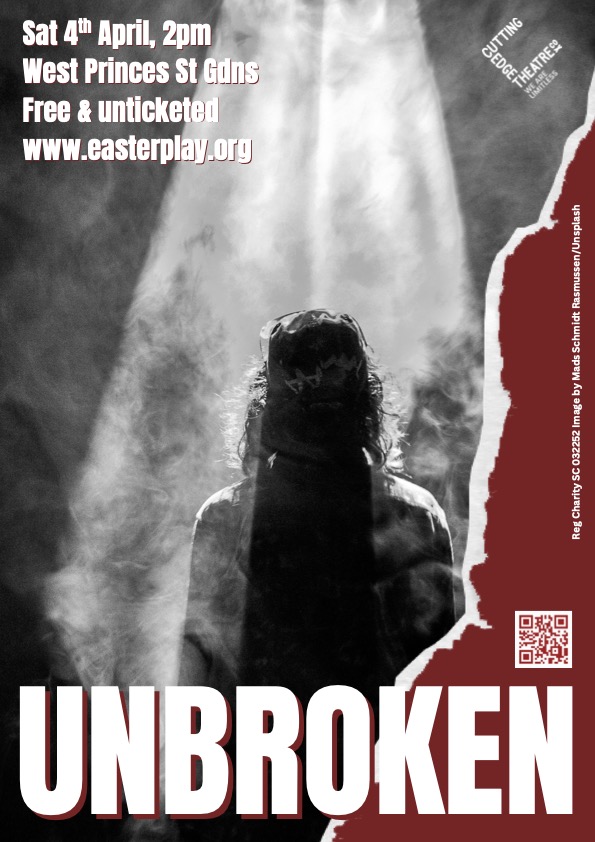Easter Play 2026 – “Unbroken”

The 2026 play will take place on Saturday April 4th, 2026 in West Princes Street Gardens at 2pm.
This year’s production is a NEW play exploring Jesus and disability – how did he respond to disabled people then and what can we learn from him today?
We are delighted to welcome some of Cutting Edge Theatre’s INSPIRE participants into the cast this year. INSPIRE is our programme specifically designed for disabled people to enjoy equal access to theatre as participants, audience members and professionals. We currently run drama classes for learning/disabled people from aged 8+ in Edinburgh, Dunfermline, Kirkcaldy and Aberdeen.
Being part of the play is a way that they can perform in a very supportive and inclusive environment. Find out more about INSPIRE through our website – http://www.cuttingedgetheatre.co.uk
You can still join our crew for 2026
We are looking for volunteers to help on the day, especially folk to make teas and coffees during the long day!
Interested ? Email us at admin@easterplay.org for more information.
BEHOLD THE MAN LIVE RECORDING 2025
There are subtitles on the recording
We hope you enjoyed the play last year!
There will be opportunities to donate to the play at the Information Tent where you can also pick up free literature. Every production costs in the region of £30,000 and we need to raise all the finance each year. You can also donate via our Stewardship page – https://www.stewardship.org.uk/partners/20109801
TREASURE HUNT 2026 – CANCELLED

Edinburgh Easter Play Treasure Hunt is sadly cancelled for 2026.
Sorry to say that, simply due to the lack of volunteers, we are not able to run the Treasure Hunt this year but, hopefully we will be able to have it up and running in 2027.
Apologies! It’s a lovely event and we love having families be part of the play and the hunt.
However, do come and see the play at 2pm this year near the Elephant Memorial. It’s a new play, shorter and very accessible.
Please note that it does contain scenes of violence with Jesus being flogged and crucified.
Edinburgh Passion Play 2025: Behold the Man
Last year’s play raised contemporary and very relevant issues about masculinity. What does it mean to be a man or a boy in today’s society? And where are the best role models to be found? As our story was set in the past, these notes are designed to give you some sense of the play’s setting, what it meant to be a man in the Roman Empire, and the masculinity of Jesus in the gospels.
The Political Situation in First Century Judea
At the time of Jesus, the small territory of Judea was under direct Roman rule, with a governor (such as Pontius Pilate) in charge. Much of the day-to-day running of the country was left in the hands of the traditional Jewish leaders, the priestly aristocracy in Jerusalem. But these men always had to operate under the beady eye of Rome – one wrong turn and they could lose their position. The Roman governor came to Jerusalem a few times a year to see what was going on, bringing with him a number of auxiliary troops. Not surprisingly, tensions were always high during these visits, and riots and upheaval were common. As the capital city, Jerusalem was rich and cosmopolitan. Although Jewish, it had been heavily influenced by both Greek and Roman culture, and Jerusalem’s elite shared the same ideas and outlook as elites in any other city. At the centre of everything was the Temple, where sacrifice was offered to the Jewish God. The whole complex had been lavishly refurbished by Herod the Great, turning it into one of the wonders of the ancient world. At Passover, the city was full to bursting with pilgrims and tourists and tensions were high.
How to be a man in the ancient world
Like other societies at the time, Judea was thoroughly patriarchal. The fundamental unit of society was the household, and the male head had a great deal of power over his family (and slaves, too, if he had them). Legally, politically, and economically, men were in charge. But it wasn’t enough just to have all the power, it was important that others held you in honour and respect, that you were seen to be “manly.” (The opposite was to be shamed, humiliated, or to be a laughing stock.) Men could become manly in a number of different ways. Coming from a good family automatically gave you a certain respect and standing, as did wealth. But the best way to assert your manliness was through glory won on the battlefield, through a display of courage, endurance, quick wit, and prowess with the sword. Even if you weren’t victorious, a noble death for your country established an enviable legacy as a manly man.



Not everyone was cut out for warfare, of course, and there were other things you could do to enhance your manliness. A man skilled in oratory, who got the better of others in debate, would also be seen as a good male role model, as would a just father at the head
of a well-ordered household. A “true man” was expected to show moderation and restraint, not to become too emotional or passionate about things. But he was very much an alpha male – active rather than passive, striving to be first at the expense of others, ready to dominate others (especially women and his social inferiors).
A manly Jesus?




In some ways, Jesus does fit the manly stereotypes of his day. He has amazing abilities and is able to cure people, drive out demons, and even command the sea and the weather. He acts as a great benefactor when he feeds 5,000 people [counting the men!]. He travels the country with twelve male disciples, and his quick wit and intelligence allow him easily to win debates with opponents. All
of this marks him out as a manly man.
But at the same time there are elements in the Jesus story that push against this. ‘Jesus’ central teaching is that the first should be last, and that people shouldn’t strive for glory and power. If anyone wants to be his disciple, he says, they should be willing to be last of all, to be like a slave (see Mark Chapter 8). What Jesus is describing here is, in many ways, the kind of behaviour associated with women, who were also expected to be passive, not to take the lead, and (in most homes) to serve others. In effect, Jesus says to his followers that they should strive to be more like women in character than alpha males.
Another place where Jesus loses his manliness is at the cross. Crucifixion was a slave’s death, reserved for bandits and nobodies. Throughout this part of the Gospel story, Jesus becomes entirely passive as other people do things to him. He’s handed over, nailed to a cross, and made fun of by a whole range of people. In the eyes of the world, he’s entirely humiliated and shamed. Of
course, the Christian claim is that it’s precisely in this shame and lack of manliness that true honour is found. The Christian message turned much-received wisdom on its head, reaching out to the poor and marginalised and urging followers to seek honour in service, manliness in putting others first.
Prof Helen K. Bond
University of Edinburgh
Want to hear more?
If you are interested in the history of Bible times, try this podcast:
Biblical Time Machine Podcast (Listen on Apple Podcasts) https://podcasts.apple.com/us/podcast/biblical-time-machine/id1648738323
(Listen on Spotify) https://open.spotify.com/show/7cNljZzhe4w3zL9t0MaOZH?



2025 Easter Play Photo Credit @bulloch.photography
For more information about previous versions of the play, visit our The story so far page.
Watch the 2022 Easter Play here
Appeal for Donations
We are ever grateful for your donations so far. As costs continue to rise, we welcome your generous contributions: please spread the word or donate here.
£10 could go towards the cost of costumes
£25 could support our access provision project
£50 could contribute to the hiring of technical equipment
£100+ could help us meet the costs of hiring a professional actor in the role of Jesus
- Use our Stewardship account to make a one-off donation or become a regular supporter. Note: Stewardship will invite you to create an account. If you’d rather not do this, simply select the option “Continue as guest”.
- If you would rather make a direct payment, send us an email at cuttingedge21@btinternet.com or call us on 0131 652 0968.
Join our ‘Lost Supper’ appeal: you could donate the cost of a coffee or an evening meal to support our project. This website gets about 5000 viewers per year. If most viewers donated the cost of a coffee, we would be able to cover the entire cost of an entire production. Would it not be great to have 5,000 “feed” our production?
Thank you!

